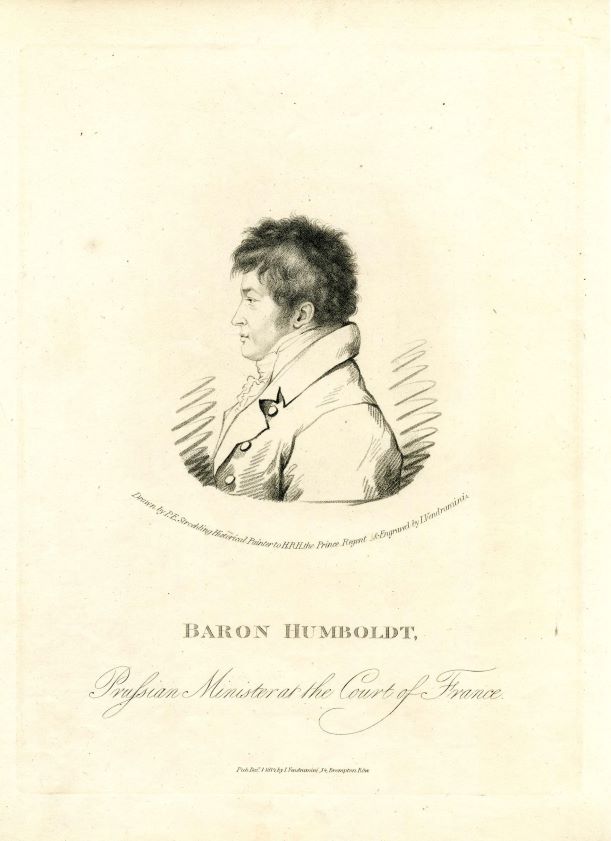Response Essay Humboldt, the State, and Human Potential
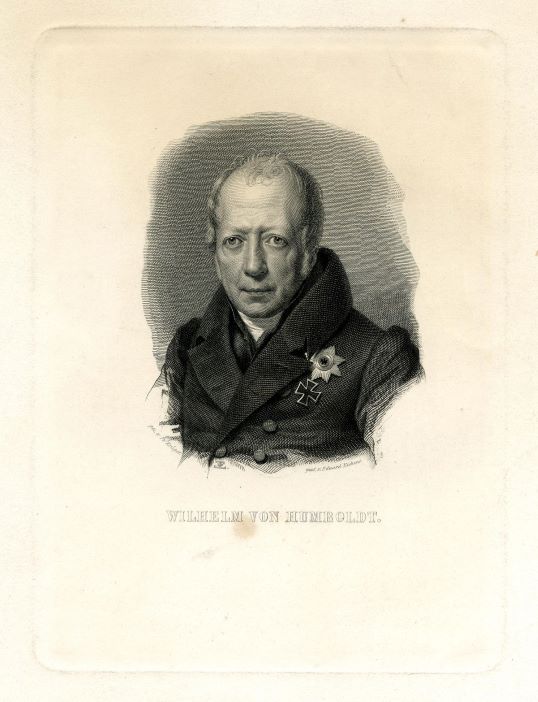 Michael Bentley has raised two different and equally essential questions in his reading of Humboldt's iconic essay on the limits of State authority. The first addresses the question of what Humboldt meant when he wrote down his ideas. The second is: does Humboldt help us understand our current predicaments? These are straightforward questions, and Michael Bentley gives straightforward answers.
Michael Bentley has raised two different and equally essential questions in his reading of Humboldt's iconic essay on the limits of State authority. The first addresses the question of what Humboldt meant when he wrote down his ideas. The second is: does Humboldt help us understand our current predicaments? These are straightforward questions, and Michael Bentley gives straightforward answers.When Wlhelm von Humboldt worked out his thoughts, he was a young man of 24 in Berlin, where he held a minor post in the local court (Kammergericht) for some time. In the summer of 1789 he traveled to Paris with his former preceptor, Campe, and watched the fateful events that led up to the abolition of feudal rights. Back in Berlin, he read a lot and wrote for himself and the public. While his thoughts on the limits of State authority were printed in their entirety as late as 1851, his comments on the French revolution and the 1791 Constitution appeared in the Berlinische Monatsschrift (Berlin Monthly Review), the flagship journal of the Berlin Enlightenment.
The Berlinische Monatsschrift was among the numerous publications that the relatively liberal government of Frederick II had favored. In the 1780s they became the expression of a critical approach to how the State acted, respectfully criticizing crucial measures taken by Berlin institutions, particularly in the field of religion and in fiscal policy. Together with the army based on the "canton system" of conscription, they were the most visible expressions of what the State meant for the average subject. Michael Bentley is certainly right in highlighting the essential difference between 'our' State and Humboldt's State, but the continuities deserve to be mentioned.
The Prussian (and for that matter the French) State in the late 18th century was much less pervasive and less moralizing than the 21st-century State. Still, men in 1791-1792 could not foresee future technological and ideological developments. To Humboldt, the State, no matter how we would describe it, was a very tangible presence, definitely more than was desirable. And it was to be stopped from encroaching on the human prerogatives that more than anything else pertained to man's moral character. After Frederick died in 1786, two areas of moral importance were impacted by measures restricting freedom of religion, through an edict checking the freedom of the pastors to preach, and freedom of the press, enforcing forms of preventative control that were disregarded for many years. (Humboldt himself submitted his manuscript to the Berlin censor provoking mixed feedback: one censor denied approval, the other approved with reservations).
These changes, in relative terms, were clearly for the worse. Even in Berlin, voices were raised to argue for autonomous developments of individuals. In 1790 Gottlob Nathanael Fischer, an otherwise unremarkable pastor and writer, alluded to these restrictions in his essay for the Berlinisches Journal für Aufklärung (Berlin Journal for the Enlightenment): "[T]he supreme law for authorities and subjects alike is to act following the laws of absolute spontaneity in the natural sphere, complying with the universal natural laws as much as possible". A discourse on human energy, personal impulse towards the good and beautiful, and respect for the variety of individual developments circulated in Berlin and Germany around 1790. It was articulated in positive terms.
Humboldt's stress on the limitations to be placed on the State Sorgfalt, as Michael Bentley has pointed out, was balanced by his concern for the active forces inherent to man. In The Limits of State Authority the word Sorgfalt, the condescending attitude of the State that takes care of its subjects to foster their happiness, is mentioned 39 times. Its frequency reflects Humboldt's mistrust in the modern State. However, the set of words that express energy (18), activity (36), force (70), and self-cultivation (Bildung, 34) appears an impressive 158 times. On top of that, freedom occurs 80 times. Dynamic notions set the tone and define the intonation of the essay. Therefore, my argument would be that Humboldt’s perspective was defined by his passion for human potential, his contemplation of the breath-taking force emanating from humans, his trust in diversity and self-invention as the foundation of happiness. To uphold this principle, careful scrutiny was necessary for the State to be kept in its proper place: not annihilated, but restrained as much as possible, especially when a new government was established, as was the case in France in 1791.
His strategy was to define the theory of human development clearly and – subsequently – adjust historical reality to the principle of autonomous self-development. The crucial dimension was temporality: happiness was possible across time, since, as Humboldt stated at the very beginning:
[I]t is in the prosecution (Streben) of some single object (Ziel), and in striving to reach its accomplishment by the combined application (Aufwand) of his moral and physical energies (Kraft), that the true happiness of man, in his full vigour and development (das Glück des rüstigen, kraftvollen Menschen), consists. Possession, it is true, crowns exertion with repose; but it is only in the illusions of fancy that it has power to charm our eyes.
In focusing on the effort rather than on results, on the potential implied in any endeavor rather than on the real, tangible outcome that "crowns exertion", Humboldt was carrying on and developing the insights of the German philosophers with whom he was familiar and who shared his languages codes and modes of communication: Lessing, Herder, Kant, Goethe, and Schiller among the others. From the point of view of what Humboldt really meant, it makes more sense to read his thoughts along with Friedrich Schiller's Über die ästhetische Erziehung des Menschen (On the Aesthetic Education of Man) more than any other text. Humboldt's thoughts went through a process of regeneration and globalization thanks to John Stuart Mill's interpretation of the English translation in 1854, but their first life was lived in letters, conversations, and manuscripts going back and forth from Berlin to Jena in the 1790s and centered on the ideals of self-development and self-cultivation.
Humboldt's posthumous life is still very much with us. This is the second important point that Michael Bentley is making. Yes, indeed: the 20th and 21st centuries have created a massive public network of institutions and agencies that have taken much if not all the place that Humboldt assigned to the moral human being, acting on his or her own to push his or her potential to the limit. And States, far more than in Humboldt's day, have proved to be the persecutors and executioners of their citizens, in some cases at least after winning legal or semi-legal democratic elections. Far from focusing on providing happiness to their population within a utilitarian framework, States have declared significant groups unworthy of the minimal safety that Humboldt advocated, no matter how grudgingly. The distinction between professional soldiers and civilians, that Humboldt disparaged as a hurdle on the way to moral self-accomplishment, has been essentially obliterated in the 20th century, as wars between regular armies have turned into scorched-earth wars against the civil populations, on both sides of the national frontiers. Everybody has been recruited to fight in the 20th century, and global terrorism as much as the war on it has blurred many distinctions in the roles and responsibilities.
The transformation of the notion of the State has been picking up pace, and it is imperative to steer its course carefully. Bentley is definitely right in claiming that there is a transtemporal and transnational element in Humboldt's thoughts. They define a vision of being human in society that, despite its transformation, still resonates with us (do we remember "the death of the subject"?). In 2021, they point in the first place to the energy, the openness to the present and the future, and the moral character that are the proper focus of Bildung. It is possible to perceive confidence in the ability of human beings to meet the challenges of their time and rise to the occasion, a positive attitude to see what has gone wrong and redress it and to prosper in the gratifying awareness of being the best of what they can get out of themselves.
Nobody knows for sure if Humboldt would have worn a protective mask in times of an unprecedented pandemic and if he would have kept social distancing from strangers. My guess is that the answer is probably yes: he would have worn a mask even before malaria killed his nine-year-old son in 1803 during his time as a Prussian envoy in Rome (as a consequence, he recommended his wife Caroline to go to Paris and safeguard the health of their surviving children). It is also an easy guess that his intensely aristocratic and elitist mindset would have resented the mobilization of collective fears on all possible media and the manipulative take of primordial emotions that the epidemic has occasioned in the age of real-time communication. However, I very much doubt that his notion of enlightened vitalism, preservation, and unfettered promotion of the natural force and élan of men, could ever contradict the necessity of increasing the chances to live a meaningful life.
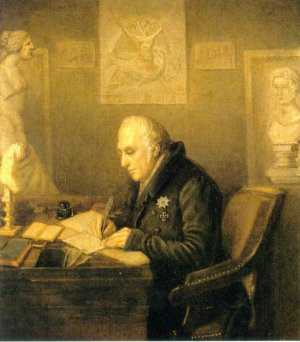
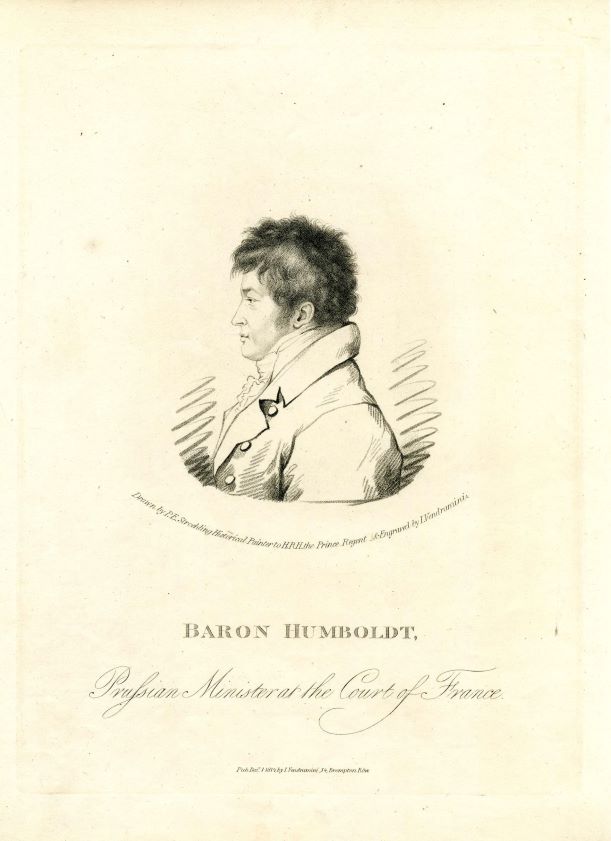 If the purpose of a lead essay is to prepare a delicious feast for the reader while leaving enough room for the correspondents to make them look as if they were a useful part of the culinary team, then Michael Bentley is a chef as one would wish.
If the purpose of a lead essay is to prepare a delicious feast for the reader while leaving enough room for the correspondents to make them look as if they were a useful part of the culinary team, then Michael Bentley is a chef as one would wish. 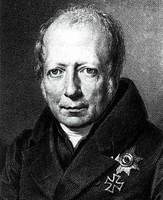 My interlocutors bring important contributions to our discussion: Edoardo Tortarolo through his knowledge – greater than mine - of Enlightenment political thought, especially in the German lands; Hartmut Kliemt through his expertise in political economy and his proposed revisions of what Humboldt’s state (and ours) amount to; and Hardy Bouillon who charmingly carries a culinary spoon to conceal the philosophical stiletto in his other hand, drawing blood in the gentlest possible way from my less plausible contentions.
My interlocutors bring important contributions to our discussion: Edoardo Tortarolo through his knowledge – greater than mine - of Enlightenment political thought, especially in the German lands; Hartmut Kliemt through his expertise in political economy and his proposed revisions of what Humboldt’s state (and ours) amount to; and Hardy Bouillon who charmingly carries a culinary spoon to conceal the philosophical stiletto in his other hand, drawing blood in the gentlest possible way from my less plausible contentions.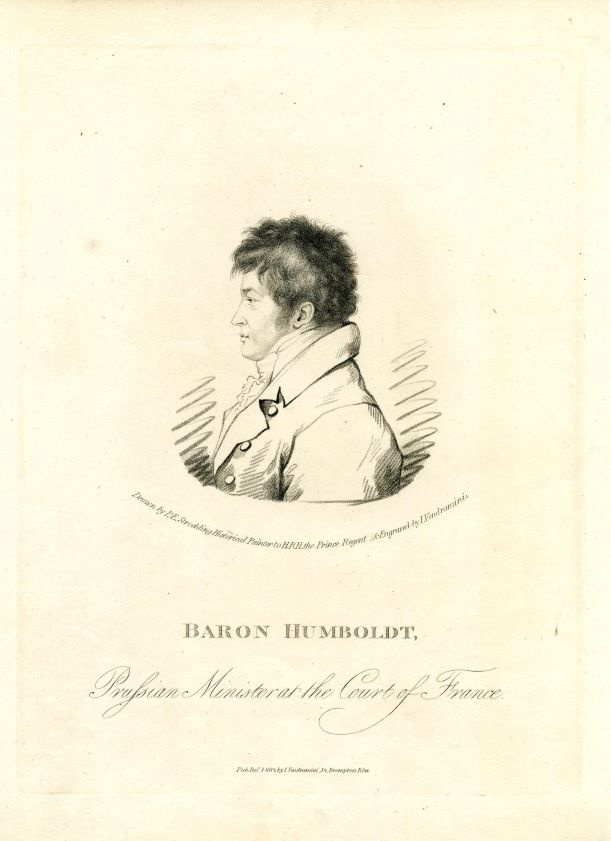 It does not come as a big surprise that modern constitutions have a hard time if they attempt to suit both the freedom individuals ask for and the moral sense democratic constitutions nourish. In light of the lead essay and the addenda as regards security and the undermining of human morality in our WEIRD states, it might be worth turning to morality as a safeguard of liberty in a constitutional state, classic or modern. Of course, Humboldt dealt only with the classic version, for he did not live to see its modern democratic heir. Humboldt saw in the “State constitution … a necessary evil” (105), not at all a safe haven, neither for liberty nor for morality. In order to provide its citizens with the security they need to attain their true end, the state has to assure them “legal freedom,” threatened not “by all such actions as impede a man in the free exercise of his powers, and in the full enjoyment of all that belongs to him, but only by those which do this unrightfully.” (67) Humboldt was aware that he “who utters or performs anything calculated to wound the conscience and moral sense of others, may indeed act immorally; but, so long as he is not chargeable with obtrusiveness in these respects, he violates no right.” (69f.) Humboldt justifies the toleration of immoral behaviour – even if it is calculated – with the observation that “it was free to those who were exposed to the influence of such words and actions to counteract the evil impression on themselves with the strength of will and the principles of reason.” (70) The strength of his argument is that it serves two masters. It safeguards freedom against accusations claiming its exercise to wound the moral sense of others. It also makes clear that the immoral performances of our fellow citizens contribute to the “variety of situations” which allow us to develop moral stance, and thus help man in the “harmonious development of his powers” (13), simply by “the strength of will and the principles of reason.” It is the moral stance of the individual, not the moral sense of others, that Humboldt guards.
It does not come as a big surprise that modern constitutions have a hard time if they attempt to suit both the freedom individuals ask for and the moral sense democratic constitutions nourish. In light of the lead essay and the addenda as regards security and the undermining of human morality in our WEIRD states, it might be worth turning to morality as a safeguard of liberty in a constitutional state, classic or modern. Of course, Humboldt dealt only with the classic version, for he did not live to see its modern democratic heir. Humboldt saw in the “State constitution … a necessary evil” (105), not at all a safe haven, neither for liberty nor for morality. In order to provide its citizens with the security they need to attain their true end, the state has to assure them “legal freedom,” threatened not “by all such actions as impede a man in the free exercise of his powers, and in the full enjoyment of all that belongs to him, but only by those which do this unrightfully.” (67) Humboldt was aware that he “who utters or performs anything calculated to wound the conscience and moral sense of others, may indeed act immorally; but, so long as he is not chargeable with obtrusiveness in these respects, he violates no right.” (69f.) Humboldt justifies the toleration of immoral behaviour – even if it is calculated – with the observation that “it was free to those who were exposed to the influence of such words and actions to counteract the evil impression on themselves with the strength of will and the principles of reason.” (70) The strength of his argument is that it serves two masters. It safeguards freedom against accusations claiming its exercise to wound the moral sense of others. It also makes clear that the immoral performances of our fellow citizens contribute to the “variety of situations” which allow us to develop moral stance, and thus help man in the “harmonious development of his powers” (13), simply by “the strength of will and the principles of reason.” It is the moral stance of the individual, not the moral sense of others, that Humboldt guards.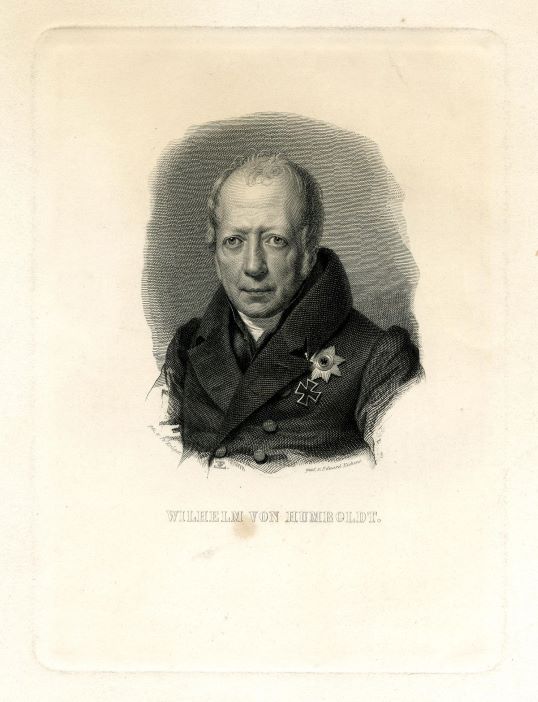
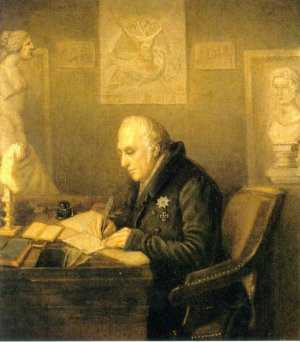 Michael Bentley states, “I neither believe that Humboldt simply failed (reasonably) to foresee later developments nor do I see – as I suspect Hartmut does – an historical ‘process’ that would lead inevitably to WEIRDness in modern society and into which Humboldt’s state needs to be enfolded.”
Michael Bentley states, “I neither believe that Humboldt simply failed (reasonably) to foresee later developments nor do I see – as I suspect Hartmut does – an historical ‘process’ that would lead inevitably to WEIRDness in modern society and into which Humboldt’s state needs to be enfolded.” 